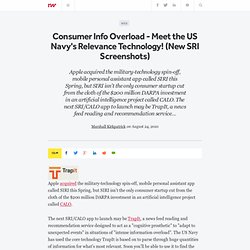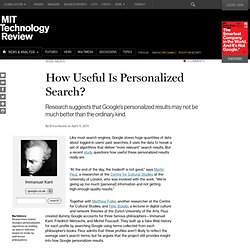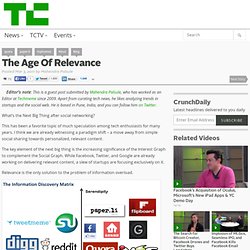

Henry Nothhaft Jr
failed humorist, domestic animal whisperer and former huskeroos spokesmodel
Trapit. Trapit. Consumer Info Overload - Meet the US Navy's Relevance Technology! (New SRI Screenshots) Apple acquired the military-technology spin-off, mobile personal assistant app called SIRI this Spring, but SIRI isn't the only consumer startup cut from the cloth of the $200 million DARPA investment in an artificial intelligence project called CALO.

The next SRI/CALO app to launch may be TrapIt, a news feed reading and recommendation service designed to act as a "cognitive prosthetic" to "adapt to unexpected events" in situations of "intense information overload". The US Navy has used the core technology TrapIt is based on to parse through huge quantities of information for what's most relevant. Soon you'll be able to use it to find the best news about your obscure interests, in the web's otherwise overwhelming ocean of Justin Bieber references. The spin-off company has lots of high-profile backing (including Li Ka-shing), will launch later this or early next year and we've got the first screenshots below. Click for a larger view. The Myth Of Serendipity.
Editor’s note: Henry “Hank” Nothhaft, Jr. is the co-founder and CMO of Trapit, a virtual personal assistant for Web content still in private beta that was incubated out of SRI and the CALO project (as was Siri, the conversational search engine bought by Apple).

One of the most interesting concepts to emerge in media and tech lately is that of “serendipity”—showing people what they want even if they didn’t ask for it. Despite its seemingly ubiquitous invocation, however, the concept of serendipity remains ill-defined and put forth as some vague panacea for a slew of emerging innovations hoping to attract new users in droves. What is needed is a closer look at what we actually mean when we talk about serendipity. From Search to Discovery Eric Schmidt’s recent remarks about Google as a “Serendipity Engine” (and Facebook’s quick reply), emphasize an important shift in our daily interaction with the Web and how we use it.
Serendipity and personalization are in fact two sides to the same coin. A Technology Innovator’s Move to Mobile. How Useful Is Personalized Search? Like most search engines, Google stores huge quantities of data about logged-in users’ past searches; it uses the data to tweak a set of algorithms that deliver “more relevant” search results.

But a recent study questions how useful these personalized results really are. “At the end of the day, the tradeoff is not good,” says Martin Feuz, a researcher at the Centre for Cultural Studies at the University of London, who was involved with the work. “We’re giving up too much [personal] information and not getting high-enough-quality results.” Together with Matthew Fuller, another researcher at the Centre for Cultural Studies, and Felix Stalder, a lecturer in digital culture and network theories at the Zurich University of the Arts, Feuz created dummy Google accounts for three famous philosophers—Immanuel Kant, Friedrich Nietzsche, and Michel Foucault. They built up a fake Web history for each profile by searching Google using terms collected from each philosopher’s books. The Age Of Relevance.
Editor’s note: This is a guest post submitted by Mahendra Palsule, who has worked as an Editor at Techmeme since 2009.

Apart from curating tech news, he likes analyzing trends in startups and the social web. He is based in Pune, India, and you can follow him on Twitter. What’s the Next Big Thing after social networking? This has been a favorite topic of much speculation among tech enthusiasts for many years. I think we are already witnessing a paradigm shift – a move away from simple social sharing towards personalized, relevant content. The key element of the next big thing is the increasing significance of the Interest Graph to complement the Social Graph. Relevance is the only solution to the problem of information overload. The above matrix is a representation of how the process of online information discovery has evolved over time. Phase I: The Search Dominated Web Phase II: Web 2.0 With Social Bookmarking Phase III: Personalized Recommendations Phase IV: Personalized Serendipity.